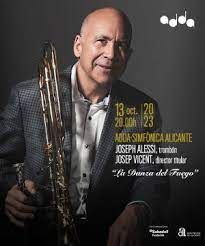The main work on the program was Richard Straus’s Also Sprach Zarathustra. It’s one of the composer’s early tone poems, and, perhaps uniquely in music, is not only based on a book, but on a work at philosophy, albeit presented as a fiction. Nietzsche’s ideas announced to the universe that there was no God. And thus human beings must develop a new way of relating to experience, a new way of relating to the world in order to live. It was the will that now asserted itself, not a faith.
Strauss’s tone poem opens with finale, a brass fanfare complete with organ that has become a pop classic. What follows is veritably an examination of the breadth of experience that a symphony orchestra can present. So vast is the range of sonorities wrapped within this half hour that often the listener has no idea where the sound is coming from. Split strings, soloists from the front desk, widely spaced harmonies for unlikely pairings, a double bassoon and a tuba competing for the bottom space, married to a complexity of orchestration that is sometimes almost bewildering, all this contributes to the effect of this remarkable work.
It is, however, fifty years since I last heard it in concert, and it might be fifty more before I attend again. For all its stunning sheen, there is also something lacking in its vision. Though Strauss insists on a programme of selected chapters from the book, too often I find alpine meadows, heroes, lions, dandy pranks, heraldic delusions, and even merry pranks surfacing. What is lacking, therefore, is an intellectual direction that justifies the title. It was Richard Strauss’s problem: the music he wrote is undeniably wonderful.
The playing of the LSO was utterly wonderful. The sound of this orchestra seems to be more integrated, more balanced than most. But when a solo voice is needed to stand out, stand out it does, and with elegance. The evening finished with an encore of an eastern European dance, which added almost a full stop to the open ending, perhaps a question mark, pianissimo pizzicato, of the tone poem.
Earlier, we heard Yeol Eum Son in Liszt’s Totentanz. “Tour de force” could equally have been its title, for it makes huge demands on the soloist. It seemed, however, that Yeol Eum Son hardly noticed, so complete was her control over Liszt’s taxing variations. It was a superb performance, appreciated by the audience to the extent that Yeol Eum Son offered some Moskovsky Sparks as an encore.
The evening had started with a work commissioned by the LSO from Hannah Kendall, a British composer, who seems to win competition prizes at will. Many of her works examine cross-cultural musical forms, and “Oh, flower of fire” was indeed related to cultural identity expressed through sound, and this identity’s search for a home. Scored for a large orchestra, the work rarely used tutti. There were long periods when all the strings were silent, and then, when they were called to play, only made passing phrasal comment.
But what this music was clearly about was the memory of West African music, as transplanted by slavery, the violent orchestral tutti, to the Caribbean. The doctored harps alongside percussion sounded like a kora being plucked in the marketplace. The violence of the orchestral interjections was surely calculated. And so, often at the limit of human hearing, surely implying the small voice of the oppressed, Hannah Kendall explored textures, sonorities and colours that were as surprising in 2023 as Richard Strauss’s surely were in 1896. In Hannah Kendall’s case, the philosophy was a more obvious part of the experience, perhaps because of the changes in human society, the rise of the individual, presaged by Nietzsche’s argument. Now we are more atomized.
At the end of the piece, Antonio Pappano actually conducted the audience. He clearly wanted silence to follow the last notes and an outstretched left arm with index finger extended kept everyone quiet for a good ten seconds.




















